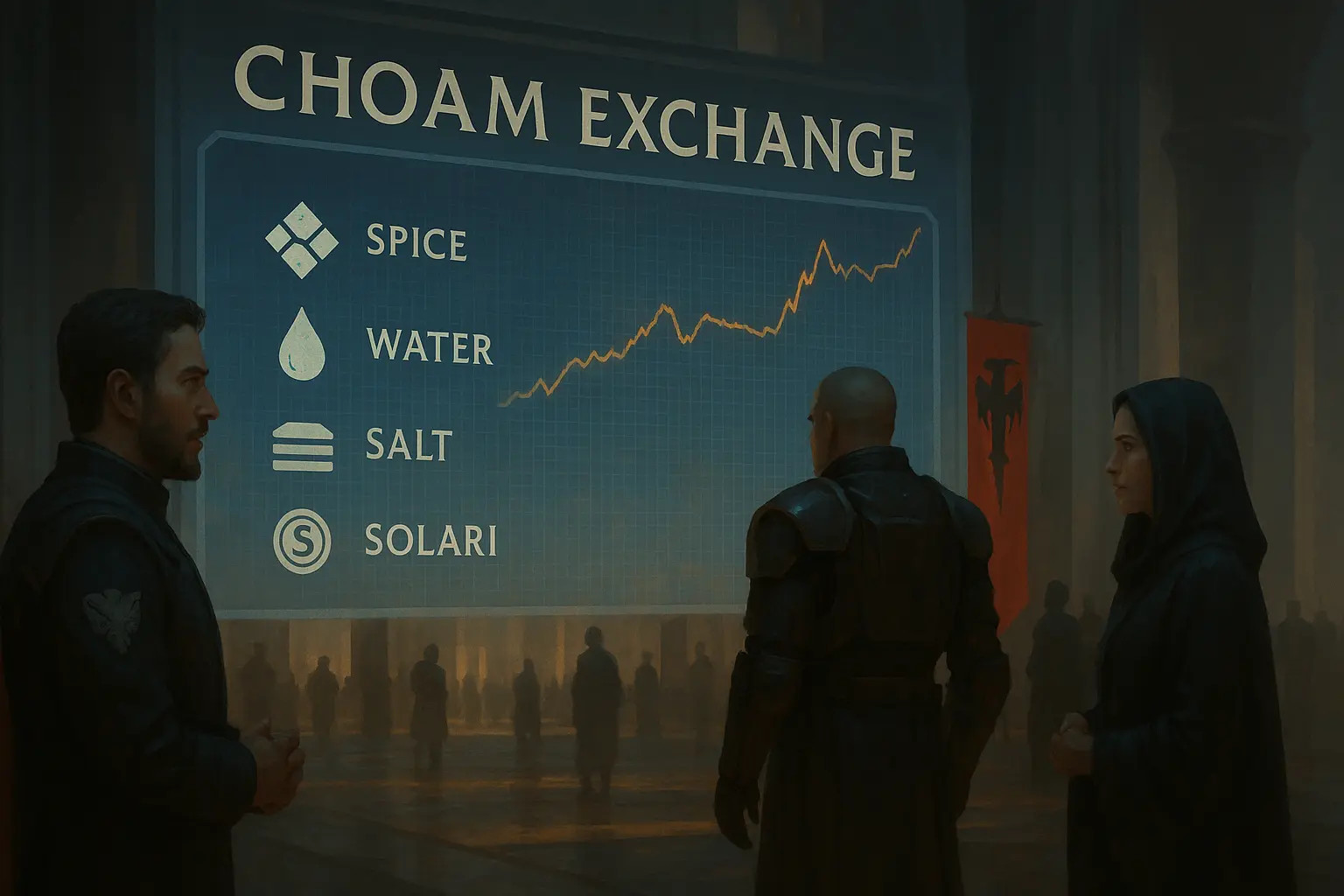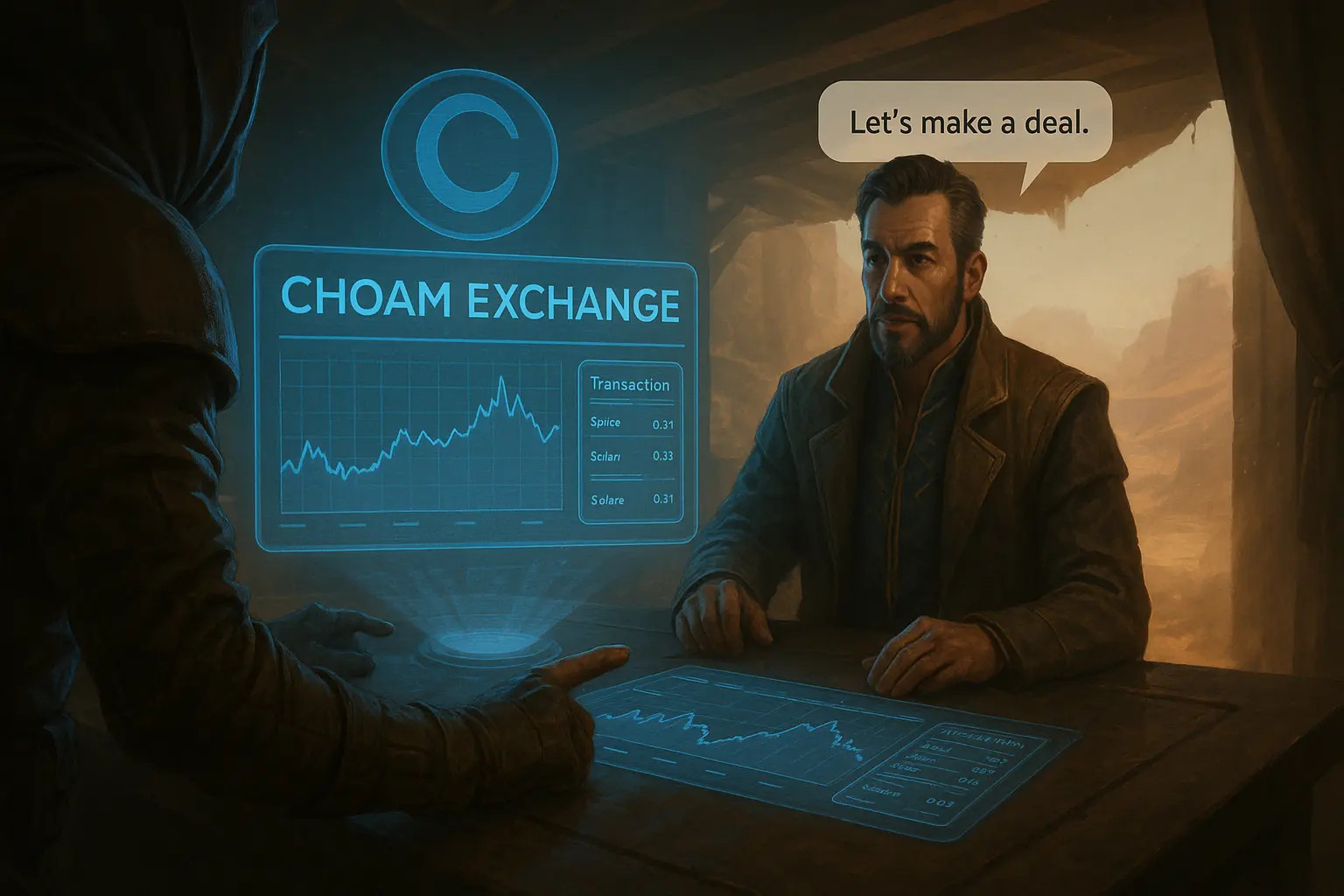CHOAM system
CHOAM (Combine Honnete Ober Advancer Mercantiles) is the galactic mega-cartel controlling all official trade in the Imperium. In Dune: Awakening, it provides basic building pieces, manages the Exchange marketplace, and collects imperial taxes. Players cannot own shares but can speculate on spice prices, sell blueprints, and optimize tax burden. CHOAM is the invisible hand of the market that regulates the game economy and maintains balance between factions. 💰

What is CHOAM in Dune Awakening?
CHOAM represents the oldest and most powerful trade organization in the known universe. The full name "Combine Honnete Ober Advancer Mercantiles" reflects its original intent - creating an "honest alliance of progressive commerce" across the entire Imperium. In practice, however, it operates as a sophisticated cartel controlling nearly all legal trade between planets.
In the game world of Dune: Awakening, CHOAM functions as an invisible force shaping every aspect of the player economy. From the simplest building materials to the most complex trade transactions - everything passes through CHOAM systems. Their influence is so pervasive that most players don't even realize it until they begin exploring the game's economic mechanics more deeply.
Why is CHOAM so important for my gaming experience? The answer is simple - without understanding how CHOAM works, you'll constantly struggle with economic problems, high taxes, and insufficient resources for expanding your base.
Frank Herbert designed CHOAM as an analogy to OPEC - the organization controlling oil exports. In the Dune context, spice is the "oil of the universe" and CHOAM is the organization that regulates its flow, thereby controlling the destinies of entire planets and civilizations.
CHOAM Ownership Structure - Who Really Rules 🏛️
The Emperor's Golden Share represents a unique tool of political control. Emperor Corrino doesn't need to own a majority of CHOAM shares; a single "golden share" is sufficient to provide veto power over all important decisions. This mechanism elegantly ensures that no economic activity in the Imperium can occur without imperial consent.
Great House Director Seats create a complex network of political relationships and economic dependencies. Each Great House holds a certain share in CHOAM corresponding to their political influence and economic strength. The Atreides might hold a larger share than the Harkonnens in one period, but political changes can quickly reverse this situation.
Interestingly, changing ownership by even a single "duodecimal point" (the basic unit of CHOAM share) can dramatically affect the economic possibilities of an entire planet. Imagine that losing a small share in CHOAM could mean your faction loses advantageous trade contracts or conversely gains access to new markets.
The Spacing Guild and Bene Gesserit operate as "silent partners" in CHOAM. The Guild controls all interstellar transportation, without which trade simply could not exist. The Bene Gesserit provide political intelligence and manipulate key personalities' decisions. Both these entities are not officially part of CHOAM leadership, but their influence is undeniable.
CHOAM in Dune: Awakening Game Mechanics 🎮

Basic Building Architecture
CHOAM building pieces form the foundation of every player base on Arrakis. When creating your first character and starting to build a base, all basic building elements - walls, doors, floors, basic furniture - come from CHOAM catalogs. This isn't just a cosmetic choice, but a practical necessity.
Recipes for CHOAM building parts are deliberately the cheapest and most accessible. Developers designed this so new players wouldn't be forced to spend their first dozens of gameplay hours merely collecting materials for basic shelter. Instead, you can quickly get into the real game content - exploration, spice mining, and political intrigue.
When you achieve higher reputation with specific factions like Atreides or Harkonnens, you can gradually replace CHOAM parts with specialized factional elements. The smart approach is to replace only the facade and public spaces while keeping functional parts like storage or workshops in original CHOAM designs - this saves considerable amounts of rare materials.
Starting Equipment and Gear
CHOAM heavy armor represents a solid middle-ground between protection and accessibility. These armors aren't the best in their categories, but they're cheap on materials and provide decent protection during first PvE expeditions. CHOAM boots, gloves, and other equipment parts serve as a reliable foundation on which you can build your combat loadout.
Facility Sets for base interiors are another example of CHOAM practicality. These items aren't visually the most attractive, but they provide all necessary functions at minimal cost. For players who want to focus on gameplay rather than decorating, CHOAM furniture represents the ideal solution.
It's important to understand that CHOAM gear isn't intended for endgame activities. It's a stepping stone that allows you to reach the level where you can craft or obtain specialized equipment from specific factions.
Exchange Marketplace - Heart of Player Economy
CHOAM Exchange functions as the central auction house for the entire Dune: Awakening server. Without this system, there would be no organized way for players to trade with each other, leading to the creation of unofficial "gray markets" and economic instability.
All significant transactions - from selling blueprints through spice trading to exchanging rare materials - must go through the Exchange system. This centralized solution allows developers to monitor server economic stability and intervene when necessary.
Spice price speculation after Coriolis storms represents one of the most interesting economic mechanics. During major storms, spice production drops in affected areas, leading to price increases on the Exchange. Smart traders buy spice before predicted storms and sell it at significant profit after their conclusion.
An important part of the Exchange is also trading in blueprints and decorative items. After each Deep Desert region wipe, demand for building plans dramatically increases as players want to quickly restore their bases. Players who regularly save blueprints of their successful constructions can generate passive income from their sales.
Tax System and Its Optimization 💸
How Imperial Taxes Work
Graduated taxation system in Dune: Awakening is designed to prevent infinite growth of mega-bases without economic consequences. Once your base's size and complexity exceed certain thresholds, you begin paying regular taxes to the imperial treasury through CHOAM systems.
Taxes are charged at regular intervals (usually every 24 hours of real time) and their amount depends on several factors: size of claimed territory, number and type of buildings, quantity of active defensive systems, and overall "value" of the base according to game algorithms.
Consequences of not paying taxes are dramatic but fair. If you don't have enough Solaris to cover tax obligations, the system gradually shuts down your base's protective shields. Without shields, your base becomes vulnerable to attacks from both other players and environmental hazards like sandstorms or wildlife.
Strategies for Tax Burden Optimization
Territorial management is key to controlling tax burden. Larger claimed area automatically means higher taxes, but not always proportionally to gained advantages. Sometimes it's better to own several smaller, strategically placed claims than one huge but inefficiently used territory.
Deep Desert exemption presents an interesting possibility for advanced players. Bases and production facilities located in Deep Desert regions don't fall under standard tax regime, but face other challenges - higher environmental hazards, greater distances from main trade routes, and increased risk of sandworm encounters.
Production balancing requires careful planning. The ideal is to achieve a situation where your base generates sufficient income (from spice mining, crafting valuable items, or trading) to cover tax obligations plus reasonable profit for further expansion.
Smart players utilize seasonal patterns in spice and other commodity prices. For example, before expected major events or content updates, demand for certain materials often rises, creating opportunities for profitable trading.
Practical Strategies for Profit Maximization 📈
Speculative Trading on Exchange
Market timing is an art requiring combination of game mechanics knowledge and observation of player behavior patterns. Spice prices are most volatile immediately after Coriolis storms, but also around major events and beginnings of new seasons.
Arbitrage opportunities arise because different players have different access to different types of resources. A player with access to high-yield spice fields can profit from selling spice to players who specialize in crafting or combat but don't have time for mining.
Inventory management for trading requires strategic thinking. Maintaining large stocks of spice or other commodities allows you to quickly react to price fluctuations, but simultaneously ties up significant capital that you can't use for other activities.
Blueprint Economy and Creative Monetization
Architectural innovation can be surprisingly profitable. Original and functional building designs sell better than generic structures. Players are willing to pay premium for blueprints that combine visual appeal with practical functionality.
Specialized facility designs for specific purposes - mining operations, defensive positions, social spaces - often achieve higher prices than general-purpose buildings. If you develop a reputation as a designer of quality specialized structures, you can charge higher prices.
Timing blueprint releases around wipes and major updates maximizes sales potential. Players are most willing to invest in new builds shortly after losing their previous structures or when new content requires adaptations of their bases.
Factional Relations and Business Opportunities
Multi-faction trading requires careful political navigation but can be very profitable. Different factions have different strengths and weaknesses in producing certain goods. Successful traders often function as intermediaries between factions that wouldn't trade directly with each other.
Reputation arbitrage means utilizing your good standing with one faction to obtain favorable prices, which you can then monetize through sales to players with worse reputation with that same faction.
Future Development of CHOAM Systems 🔮
Planned Economy Expansions
Advanced trading mechanics are hinted at in developer blogs and community discussions. Possible future features include commodity futures contracts, more sophisticated taxation systems, and perhaps even limited player ownership in CHOAM subsidiaries.
Enhanced faction integration may in the future allow players to directly influence CHOAM policies through high-level political gameplay. Imagine being able to vote on trade regulations or propose new economic initiatives.
Cross-server economic systems could connect economies of different game servers, creating a truly galactic marketplace corresponding to the scope of the Dune universe.
Seasonal Events and Economic Opportunities
Limited-time economic events inspired by major story developments in the Dune universe could create unique trading opportunities. For example, simulation of spice shortage or discovery of new deposits would dramatically affect market dynamics.
Collaborative economic goals for entire server communities could bring rewards in the form of temporary tax breaks, improved Exchange features, or access to exclusive CHOAM catalog items.
Advanced Tips for CHOAM Mastery 💡
Optimal Timing for Major Decisions
Base expansion planning should account for tax cycles. The best time for major construction projects is shortly after paying taxes, giving you maximum time to generate revenue before the next tax cycle.
Resource stockpiling strategies require balance between opportunity cost and security. Holding large inventories ties up capital but provides flexibility during market volatility or supply disruptions.
Advanced Market Analysis
Supply chain tracking means monitoring not only prices but also underlying factors affecting supply and demand. Political events, weather patterns, and player behavior trends all influence market conditions.
Competitive intelligence within the Exchange system allows you to identify other players' trading patterns and anticipate their moves. This isn't about griefing, but about understanding market dynamics.
Risk Management in CHOAM Environment
Diversification strategies are crucial for long-term success. Relying on only one type of economic activity makes you vulnerable to market shifts or game balance changes.
Liquidity management means maintaining sufficient Solaris reserves for unexpected opportunities or emergency situations while simultaneously maximizing returns on invested capital.
Final Recommendations 🎯
CHOAM in Dune: Awakening isn't just background lore or a passive game system - it's an active economic force that can dramatically influence your success on Arrakis. Understanding its mechanics and learning how to exploit them isn't just about making money, but about gaining fundamental control over your game experience.
The most important lesson is that CHOAM systems are designed to reward strategic thinking and long-term planning over impulsive decisions. Players who invest time in understanding economic patterns and market dynamics gain significant advantages not only in terms of wealth but also in political influence and strategic options.
Remember that in the world of Dune, economic power is often more important than military might. CHOAM provides you with tools for acquiring and wielding this power - but only if you understand the rules of the game and are willing to play them strategically.
Related Articles:
- Spice and Power in Dune Awakening - The Heart of Arrakis
- 15 Things You Must Know Before Launching Dune: Awakening!
- Factions and Houses in Dune Awakening - What Players Can Expect
FAQ
Q: Can I buy CHOAM shares in-game?
A: No, direct purchase of CHOAM shares isn't possible. Players can only influence the economy through Exchange trading and tax optimization.
Q: How often are imperial taxes collected?
A: Taxes are charged every 24 hours of real time based on your base's size and complexity.
Q: What happens if I don't pay taxes?
A: The system gradually shuts down your base's protective shields, making it vulnerable to attacks and environmental hazards.
Q: Where can I find the best prices for selling spice?
A: Monitor the CHOAM Exchange after Coriolis storms, when supply drops and spice prices rise.
Community and Newsletter
Want to be the first to know about the latest news? Join our CZ/SK community Discord where you'll find the freshest updates in the #herní-novinky channel! 🎮💥 You can also join discussions, find new friends, fellow players, participate in GIVEAWAYS and win peripherals or game keys that interest you! 🔑👾
Thanks to your support, I can create quality gaming content and bring you the latest information from the gaming world 🎮. Some links in my articles may be affiliate links - when you shop through them, I receive a small commission without changing the price for you. All products and games I recommend are carefully selected and personally tested. This income helps me remain an independent creator and bring you objective reviews and opinions. If you like my content, you can also support me through Twitch membership, YouTube or Discord Nitro boost. Thank you for your support! - MagicStark 💎

Daniel Haša
🎮 Streamer | 🎥 Content Creator | 📈 SEO Specialist | 🎮 Gamer & Beta Tester | ✍️ Copywriter | 🧠 AI user
Daniel is a passionate gamer and content creator who specializes in gaming reviews, guides a Gaming news from all over the world. He regularly streams on Twitch, creates detailed YouTube videos, and brings exclusive articles to magicstark.cz. He covers the latest titles, provides in-depth gaming analyses, and helps players get the most out of themselves.























